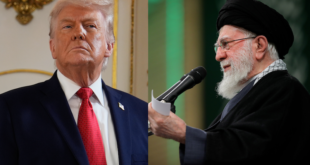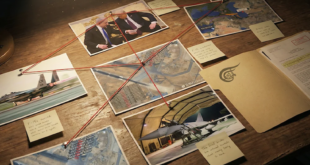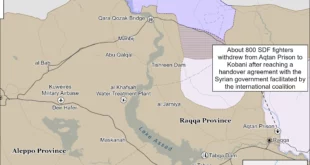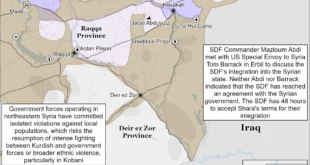 TEHRAN (Fars News Agency)- Iran’s Supreme National Security Council (SNSC) Secretary Ali Larijani described US invasion of Iran’s nuclear sites as impossible, stressing that the US build-up in the Persian Gulf and Washington’s threats serve as a part of a psychological war on Iran.
TEHRAN (Fars News Agency)- Iran’s Supreme National Security Council (SNSC) Secretary Ali Larijani described US invasion of Iran’s nuclear sites as impossible, stressing that the US build-up in the Persian Gulf and Washington’s threats serve as a part of a psychological war on Iran.
Speaking to reporters in the central city of Qom on Friday, Larijani noted recent moves in the region for sowing discord between the Muslim Shiites and Sunnites and said, “Such moves are a result of a detailed planning on the basis of intelligent data and information and are sparked by the US, Britain and some regional countries.”
He dismissed some earlier reports about US invasion of Iran’s nuclear facilities, saying that such reports are unreal, and continued, “This is not the first time such reports are released. Such psychological moves have been conducted against Iran several times during the last one year.”
Meantime, the official stressed the need for the Iranian armed forces to show full vigilance, and added, “Invasion of Iran is of a low possibility and the reports released in this regard are a product of a kind of artificial coalition to impose pressure on Iran.”
Referring to the manufacture of satellite carrying missiles by Iran, he said, “This is a very significant technology which is possessed only by big powers.”
Iran’s chief nuclear negotiator further pointed to the Europeans’ plan for halting of nuclear activities in Iran, and said, “Their proposal made us stop the voluntary suspension of uranium enrichment, and now both Europeans and (IAEA Director General) Mohammed ElBaradei have realized the move has been just a mistake.”
“Iran suspended its nuclear activities in a bid to reach an understanding on the basis of which it could conduct its plans, but when the Europeans presented their unfair plan, we resumed our nuclear activities and we managed to prepare our first cascade of centrifuges for uranium enrichment within 8 months,” he continued.
Asked about EU’s package of incentives, he said, “We welcomed the incentives and we never gave up negotiations, rather these were the Europeans who aborted the talks.”
“This proved that Europeans pursued some other goals. Iran has accessed a highly significant capability,” Larijani reminded.
He also said that Europeans fear Iran’s access to hi-tech, and added, “They oppose the Islamic vigilance that Iran has brought to the region.”
“We believe that if the people in the region can dominate their own fate, then many of the problems will be removed,” the official stressed, reminding that the US is, in practice, opposed to the establishment of democracy in the region, although it chants the slogan of ‘democracy for all’ within the New Middle-East plan.
“If you really seek to democratize the region, why do you oppose Hamas (which has ascended to power through democratic elections) in Palestine,” he questioned, addressing American officials.
He further advised the US to take a lesson from the results of the recent midterm elections in that country and take a better and more precise look at the Middle-East.
Meantime, Larijani underlined Iran’s nuclear progress and mentioned that Tehran would not withdraw from its nuclear stances and will continue its nuclear operations.
“We do not perceive any reason to drop our activities and jeopardize the future of this land and the Iranian generations to come,” he stressed.
The nuclear official also dismissed the recent remarks by the German ambassador to Tehran, and said, “His remarks indicate his lack of information. This was actually the European Union which did not accompany Mr. Solana.”
“Mr. Solana entered the talks on behalf of the EU and 5+1 and we reached an understanding, but the European Union did not accept the agreement we have reached for a reason which is unknown to us,” he said.
He rejected the statements made by the German ambassador to Tehran alleging that Larijani had accepted a short-term suspension of nuclear enrichment during his talks with EU Foreign Policy Chief Javier Solana, and underlined, “You may refer to the 11 articles of our agreements and you can see that there is no indication about suspension of enrichment activities in those articles. We merely endorsed a principal understanding for future so that all the concerns of both sides would be eased up.”
Larijani stressed once again that all Iran’s nuclear activities comply with the NPT and that the referral of Iran’s nuclear case to the UN Security Council lacks legality.
“Our nuclear case is void of technical or legal problems,” he said, adding that the United States has been making an instrumental use of the UN Security Council to oppose Iran.
He also reiterated that Iran welcomes any opportunity for the peaceful settlement of the nuclear issue.
 Eurasia Press & News
Eurasia Press & News



